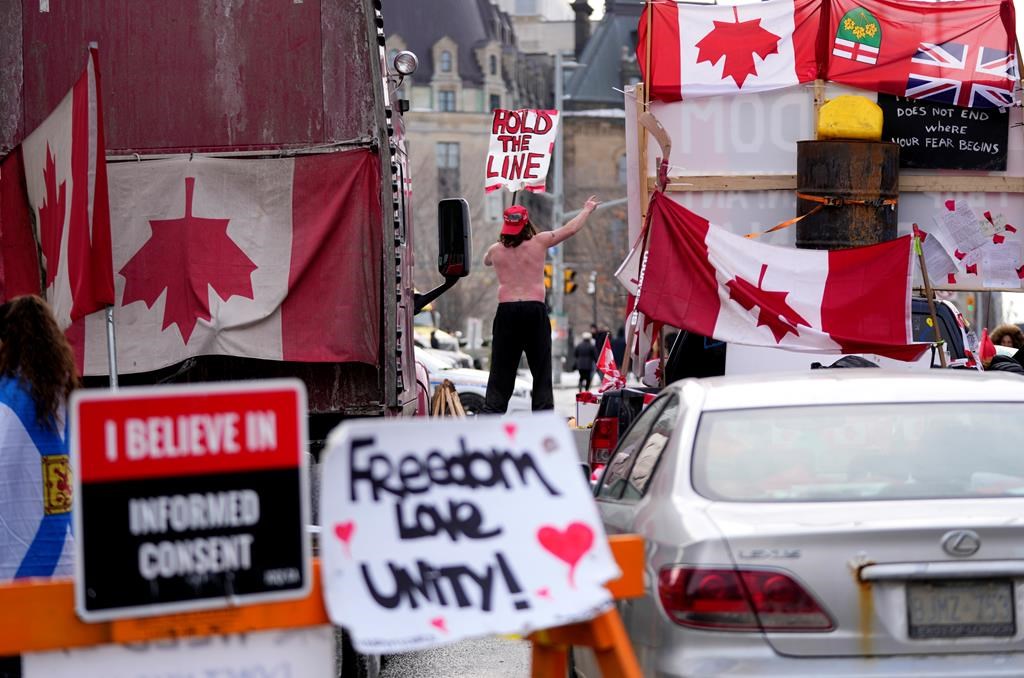TORONTO — Ontario “abandoned” the people of Ottawa during the so-called “Freedom Convoy” protests last winter, the inquiry into the use of the Emergencies Act found in a report released Friday.
Justice Paul Rouleau, the inquiry’s commissioner, concluded that Ontario was reluctant to become “fully engaged” with the City of Ottawa and the federal government and called the province’s reluctance to resolve the situation in Ottawa “troubling.”
He found that better collaboration at the political level from the start could have helped the “communication, jurisdictional, and resourcing issues that plagued the early response to the protests.”
“It could also have provided the people of Ottawa with a clear message that they had not been abandoned by their provincial government during a time of crisis,” Rouleau wrote.
The Public Order Emergency Commission found the federal government met the threshold for invoking the act amid the weeks-long protests last year in Ottawa, Windsor, Ont., and Coutts, Alta.
The commission produced a 2,000-page report detailing Rouleau’s analysis of the evidence presented during public hearings last fall, and makes 56 recommendations directed at improving police operations and the use of the act itself.
The inquiry heard Ontario Premier Doug Ford and then-solicitor general Sylvia Jones were slow to respond to requests for help from the City of Ottawa and the federal government.
The province refused to become involved in meetings with the city and the federal government because it believed the protests were a police matter for the Ontario Provincial Police, the inquiry heard.
The province also felt it was the federal government’s responsibility to resolve the situation in Ottawa because the protests were based on the federal vaccine mandate.
Rouleau concluded that Ontario only got fully involved when protesters blocked the Ambassador Bridge in Windsor, which is a major trade route with the United States.
A spokesman for the solicitor general said Friday the province was “squarely focused” on the “occupations in Ottawa and Windsor” by providing tools to police to bring the situation to an end.
“The Ontario Provincial Police provided intelligence before the occupations even began, deployed officers, and continued to provide resources to Ottawa Police and Windsor Police Services in response to their requests for further operational support,” said Michael Harrison.
“Ontario declared a state of emergency prior to, and independent of, the federal government’s use of the Emergencies Act. Prior to any declaration of emergency, we had already frozen convoy funds from the Give Send Go platform to hinder efforts to continue illegally occupying the streets of Ottawa.”
Harrison said the province passed the Keeping Ontario Open for Business Act in April 2022, which allows it to respond immediately to future disruptions.
The premier’s office did not answer questions about the report and referred to the statement by the solicitor general’s spokesman.
The commissioner issued a summons to Ford and Jones to testify at the inquiry, but the pair refused and fought the summons in Federal Court.
The judge in that case upheld the summons, but sided with Ford and Jones because they exercised their right to Parliamentary privilege.
“The Commission would have greatly benefited from the perspective that their testimony could have provided,” Rouleau wrote.
Rouleau made several recommendations to the province.
“The Province of Ontario should consider the creation of a major event management unit, analogous to the unit created for major case management of investigations,” Rouleau wrote.
“A major event management co-ordinator could ensure that integrated command and control is immediately initiated where identified criteria are met and could facilitate the sharing of intelligence and other information, as well as the accumulation of resources.”
The New Democrats said the report shows Ford’s “spinelessness.”
“Commissioner Rouleau’s report confirms what has been clear all along: that Doug Ford and his cabinet turned their backs on the people of Ottawa at a moment of crisis,” said Joel Harden and Chandra Pasma, both Ottawa members of provincial parliament, in a statement.
“They chose not to use the resources at their disposal to help Ottawa residents experiencing what the commissioner found to be an ‘unsafe’ and ‘chaotic’ situation.”
This report by The Canadian Press was first published Feb. 17, 2023.



